湘少版小学英语六年级上册期末复习课件
图片预览
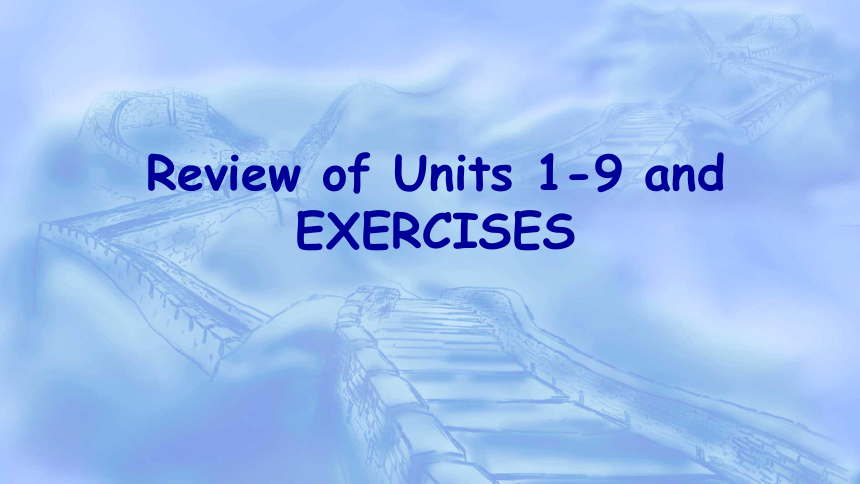
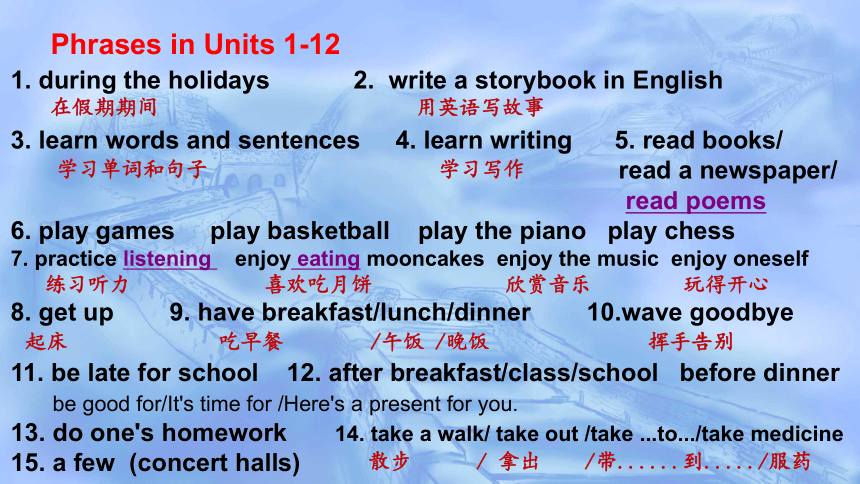
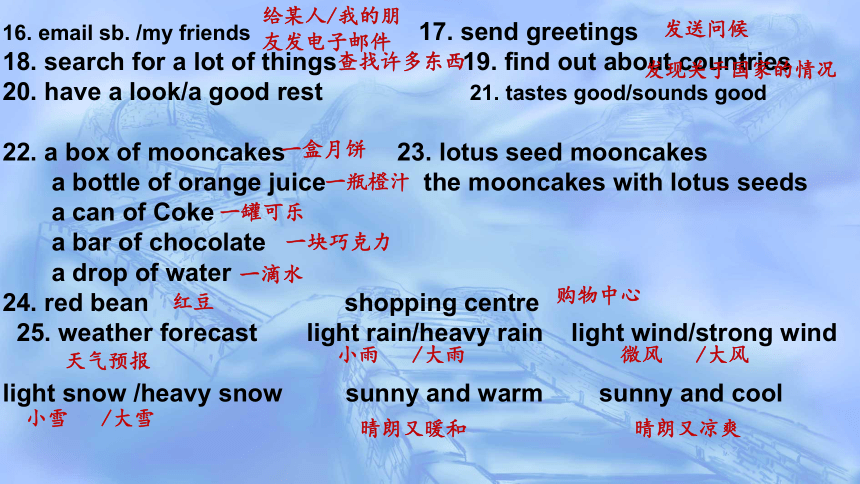
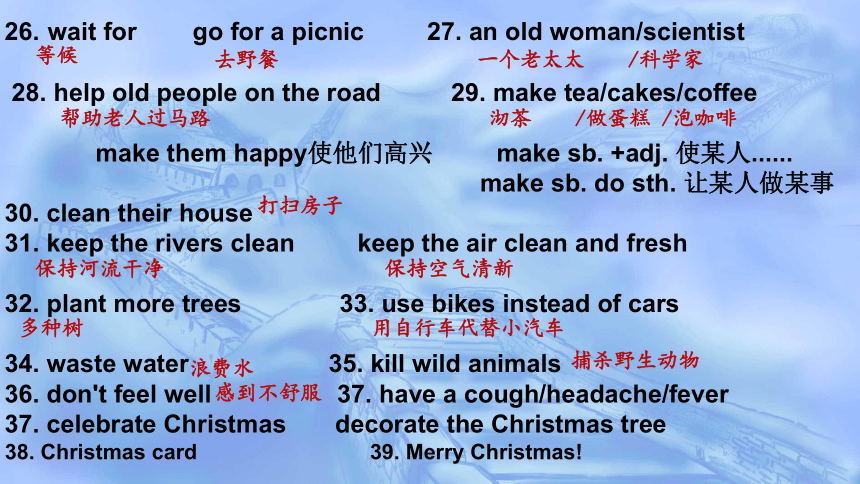
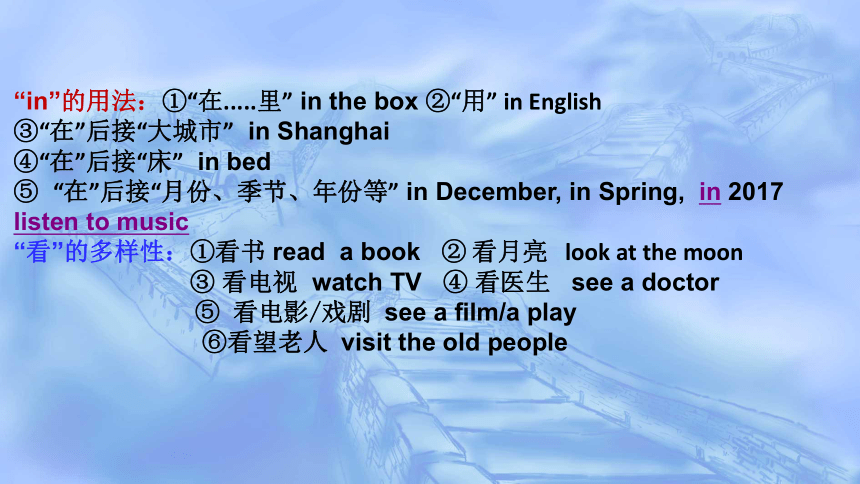
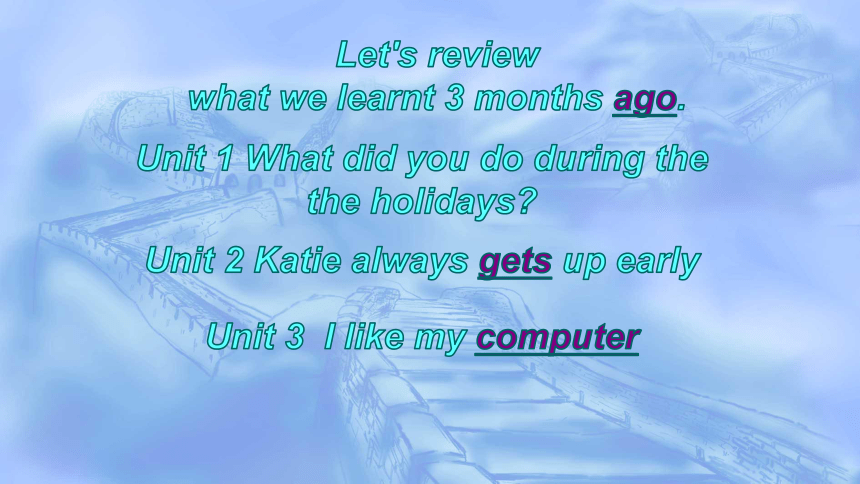
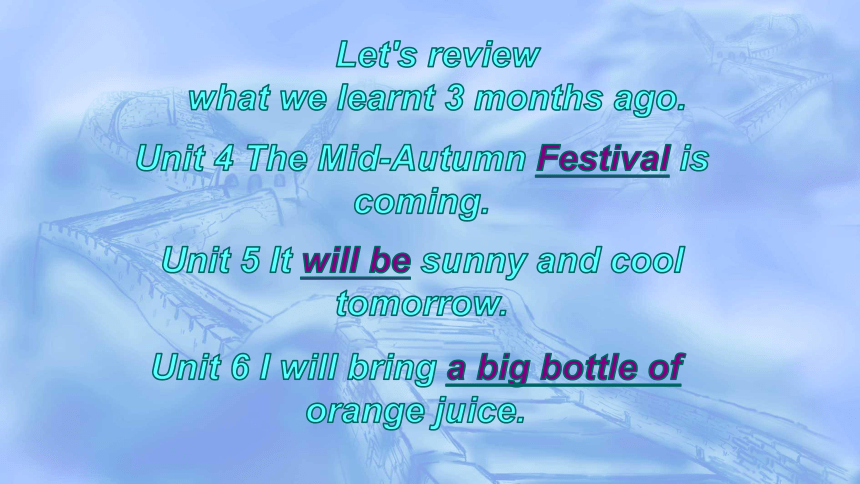
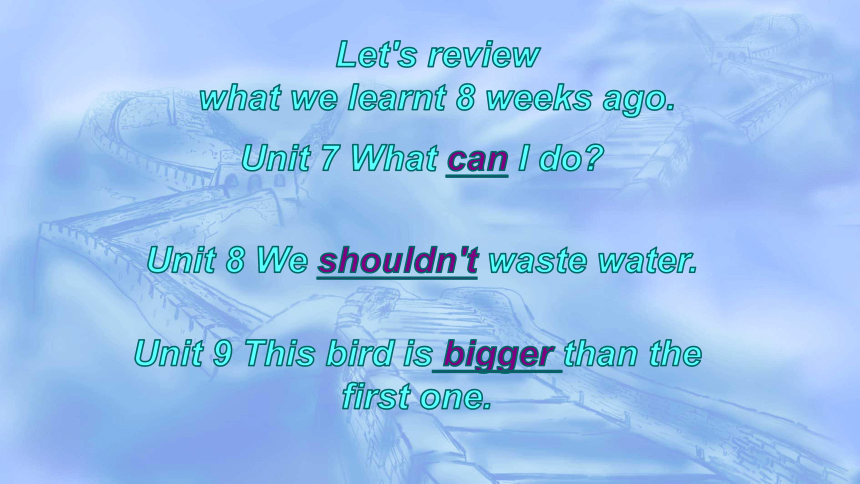
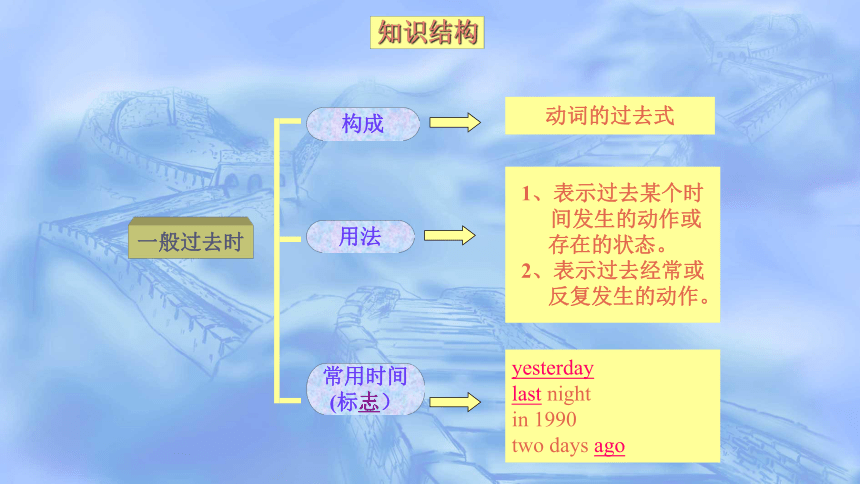
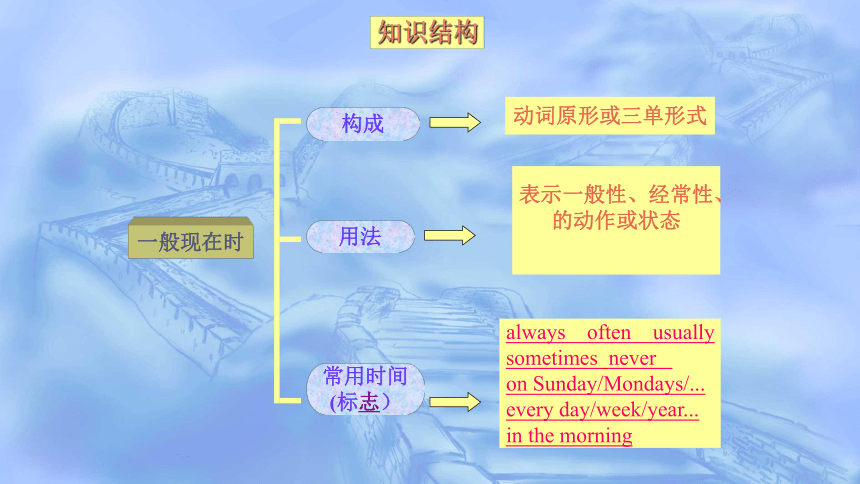
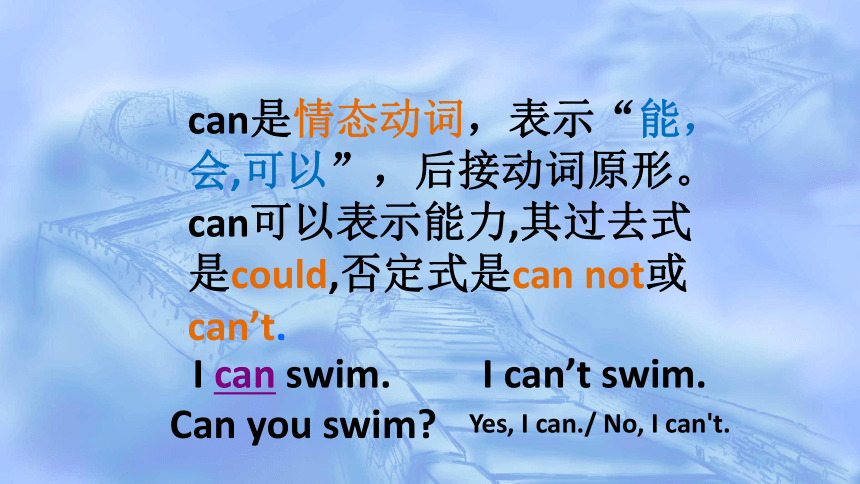
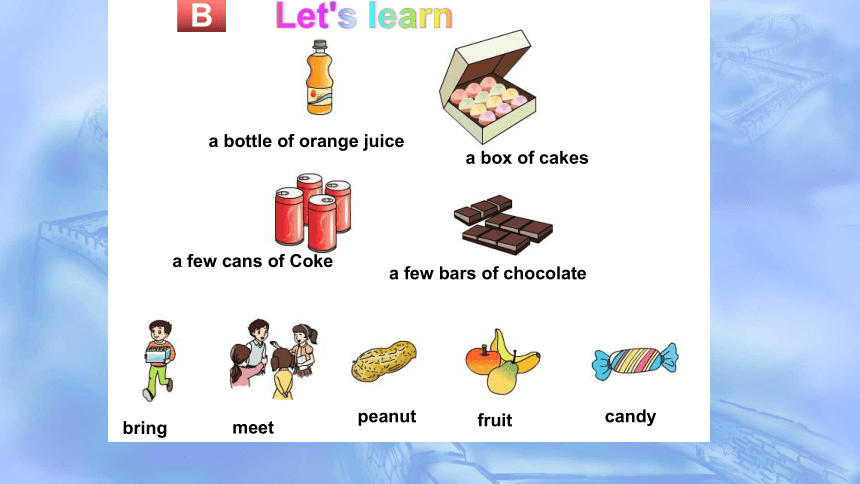
文档简介
课件33张PPT。Review of Units 1-9 and EXERCISESPhrases in Units 1-121. during the holidays 2. write a storybook in English
3. learn words and sentences 4. learn writing 5. read books/
read a newspaper/
read poems
6. play games play basketball play the piano play chess
7. practice listening enjoy eating mooncakes enjoy the music enjoy oneself
8. get up 9. have breakfast/lunch/dinner 10.wave goodbye
11. be late for school 12. after breakfast/class/school before dinner
be good for/It's time for /Here's a present for you.
13. do one's homework 14. take a walk/ take out /take ...to.../take medicine
15. a few (concert halls)在假期期间用英语写故事学习单词和句子学习写作练习听力喜欢吃月饼欣赏音乐玩得开心起床吃早餐 /午饭 /晚饭挥手告别散步 / 拿出 /带......到...../服药16. email sb. /my friends 17. send greetings
18. search for a lot of things 19. find out about countries
20. have a look/a good rest 21. tastes good/sounds good
22. a box of mooncakes 23. lotus seed mooncakes
a bottle of orange juice the mooncakes with lotus seeds
a can of Coke
a bar of chocolate
a drop of water
24. red bean shopping centre
25. weather forecast light rain/heavy rain light wind/strong wind
light snow /heavy snow sunny and warm sunny and cool
给某人/我的朋友发电子邮件发送问候查找许多东西发现关于国家的情况一盒月饼一瓶橙汁一罐可乐一块巧克力一滴水红豆购物中心天气预报小雨 /大雨微风 /大风小雪 /大雪晴朗又暖和晴朗又凉爽26. wait for go for a picnic 27. an old woman/scientist
28. help old people on the road 29. make tea/cakes/coffee
make them happy使他们高兴 make sb. +adj. 使某人......
make sb. do sth. 让某人做某事
30. clean their house
31. keep the rivers clean keep the air clean and fresh
32. plant more trees 33. use bikes instead of cars
34. waste water 35. kill wild animals
36. don't feel well 37. have a cough/headache/fever
37. celebrate Christmas decorate the Christmas tree
38. Christmas card 39. Merry Christmas!
等候去野餐一个老太太 /科学家帮助老人过马路沏茶 /做蛋糕 /泡咖啡打扫房子保持河流干净保持空气清新多种树用自行车代替小汽车浪费水捕杀野生动物感到不舒服“in”的用法:①“在.....里” in the box ②“用” in English
③“在”后接“大城市” in Shanghai
④“在”后接“床” in bed
⑤ “在”后接“月份、季节、年份等” in December, in Spring, in 2017
listen to music
“看”的多样性:①看书 read a book ② 看月亮 look at the moon
③ 看电视 watch TV ④ 看医生 see a doctor
⑤ 看电影/戏剧 see a film/a play
⑥看望老人 visit the old people Let's review
what we learnt 3 months ago.Unit 1 What did you do during the
the holidays?Unit 2 Katie always gets up earlyUnit 3 I like my computerLet's review
what we learnt 3 months ago.Unit 4 The Mid-Autumn Festival is coming.Unit 5 It will be sunny and cool tomorrow.Unit 6 I will bring a big bottle of orange juice.Let's review
what we learnt 8 weeks ago.Unit 7 What can I do?
Unit 8 We shouldn't waste water.Unit 9 This bird is bigger than the first one.知识结构一般过去时构成用法常用时间
(标志)动词的过去式1、表示过去某个时
间发生的动作或
存在的状态。
2、表示过去经常或
反复发生的动作。yesterday
last night
in 1990
two days ago知识结构一般现在时构成用法常用时间
(标志)动词原形或三单形式 表示一般性、经常性、
的动作或状态
always often usually
sometimes never
on Sunday/Mondays/...
every day/week/year...
in the morningcan是情态动词,表示“能,会,可以”,后接动词原形。
can可以表示能力,其过去式是could,否定式是can not或can’t. I can swim. I can’t swim. Can you swim? Yes, I can./ No, I can't.Part C a bottle of orange juice Let's learnBa box of cakes a few cans of Coke a few bars of chocolate bring meet peanut fruit candy a bottle of ... 意为“一瓶.....”,这一结构相当于汉语的数量词,of 后接名词,类似的还有:
a box of pencils
two cans of Coke
three baskets of apples
a few bars of chocolate
five cups of tea
当这些数量词短语作主语时,其谓语动词要与of 前的名词的数保持一致。如: Here's a bottle of milk.
There are two bottles of milk on the table.
1)I will bring a bottle ____ water. A. to B. of C. for
2) There ___ three cups of tea on the table.
A. are B. is C. wasBA一、用括号内所给动词的正确形式填空1. My grandpa always ____ up early.(get)
2. Can you ____ to my party now?(come)
3. What ___ you ___ last weekend?(do)
4. I ______my grandparents last Sunday. (visit)
5. My father _______ me a phone on the Mid-Autumn Festival. (buy)
6. It ________ Saturday yesterday.(be not)
7. She ___________ apples.(not like)
8. We ___________ at home during the National Holidays.(国庆长假)(not stay)
getscomedid dovisitedboughtwas notdoesn't likedidn't stay二、我能补全单词 。 (20分)
( )1. d ing A. ar B.or C.ur
( )2. h iday A. ol B.al C.el
( )3. ema A. el B.ol C. il
( )4. ret n A. ar B.ur C.er
( )5. l rn A. ea B.ee C.ae
( )6. n er A. ev B.av C.uv
( )7. sear A.ch B.sh C.th
( )8. sp k A. ea B.ee C.aa
( )9. pr tise A. ac B. ec C.ea
( )10. w ld A. ar B. er C.or CACBAAAAAC三、选出不同类的单词。(10分)
( )11. A. four B. eighth C. seven
( )12. A. writing B. reading C. interesting ( )13. A. played B. learn C. went
( )14. A. was B . did C. were
( )15. A. computer B. talk C. newspaperBCBBB四、我能完成句子(单项选择)。 (20分)
( )16. Glad see you again.
A. to B . at C.of
( )17. My grandpa always very early.
A. get up B. getting up C. gets up
( )18. His father bought a computer.
A. his B. him C. her
( )19. Dino stood up, but sit down.
A. did not B. is not C. do not
( )20. My brother is very naughty, but he sometimes
___ ___________ before dinner.
A. does my homework B. does his homework
C. does her homeworkACBAB ( )21. She is late for school. So his teachers like him.
A. never B. always C. often
( )22. Listen ! Mr Li song.
A. sings B. is singing C. singing
( )23. What you do during the holidays?
A. do B. did C.done
( )24. Anne a storybook in English during the holiday.
A . writing B. write C. wrote
( )25. My mum bought me a computer ______my birthday.
A. for B. on C. aboutABBCA五、 找出符合图片内容的正确选项。(20分)BAACABBABA五、 情景对话。(10分)
( )36.当你想询问同学的暑假生活时,可以说:
A. What did you do during the holidays ?
B. What are you doing ?
( )37.新学期开始了,碰到同学和朋友,你会说:
A. How old are you ?
B. Glad to see you again.
( ) 38.凯蒂总是很早起床,可以说:
A.Katie always gets up early.
B. Katie never gets up early.
( )39.当你告诉别人玲玲经常早上6点起床时,应该
说:
A.Lingling often gets up at 6:00 a.m.
B.Lingling often gets up at 6:00 p.m.
( )40.当你想告诉别人你很喜欢自己的电脑时,可以
说:
A.I like my computer.
B. I like my flower. ABAAA 6. enjoy 喜欢,享受 后面接名词, 代词, 动名词作宾语。I enjoy games. She enjoys her dinner. We enjoyed ourselves last weekend. enjoy oneself--- have fun 玩得开心,过得愉快 I enjoy doing… 我喜欢/享受做某事 eating mooncakes.
I enjoy
looking at the moon. 句型详解What’s the weather like tomorrow?
明天的天气怎么样?
回答:It will be + 天气形容词(sunny, clear...), 或者There will be + 天气名词(a heavy rain,a light wind...)。
How's the weather tomorrow?
Peter asks himself, "What can I do?"
"I can clean their houses."
5. himself 是反身代词,myself,
ourselves, yourself, yourselves,
himself, herself, itself, themselves
在句中常常作宾语(只有主宾为同一者时)。
如: I can teach myself English.
Can you make cakes by yourselves, kids?meusyouhimheritthemmine oursyourshishersitstheirsshould是情态动词,表示“应该,应当”,后接动词原形。否定式是should not或shouldn’t. We should save water. We shouldn't waste water. Should we save water? Yes, we should.6. enough修饰名词,放在其前,修 饰形容词或副词,放在其后。“出名在前,赴刑在后”
enough time, cold enoughUnit9 This bird is bigger than the first one.one是代词,代替birdyoung-yonger-yongest old –older -oldest tall-taller -tallest small-smaller -smallestearly-earlier-earliest busy-busier-busiest(一)单音节或部分双音节
1. 一般情况下加-er 或-est :2. 以字母e结尾的形容词,加-r 或- st4. 以 “辅音字母+y”结尾的双音节词,先改“y”为“i”,再加-er 或-est.big—bigger -biggest fat—fatter-fattest形容词比较级最高级规则nice –nicer-nicest safe –safer -safest3. 重读闭音节词只有一个辅音字母时,应先双写辅音字母,再 加-er或-est.一(重读的辅元辅)(二)多音节词(少数双音节词)在前加 more构成比较级,加most构成最高级。 beautiful --more beautiful --most beautiful
important --more important--most important
不规则变化两好、两坏、两多、 一少、一老.1.have与表示疾病的名词连用,表示“得(病)”、“患(病)”
如:have a cold 感冒
have a headache(患了)头痛、
have a cough (患了)咳嗽、
have a fever 发烧
【知识拓展】have 还可以与很多单词特别是那些既是名词又是单词的连用,构成很多短语。如:
have a look, have a swim, have a rest, have a picnic,
have a class....don’t feel wellhave a coughhave a headachehave a fevertake medicinehave a good rest let's learnB2. What's wrong with you?
你怎么了?
句中的wrong表示“有问题的,有毛病的”。此句还可以意为“你有什么麻烦?”或“你怎么了?”一般用于医生对病人的询问。
What's the matter with you?
/What's your trouble?
3. learn words and sentences 4. learn writing 5. read books/
read a newspaper/
read poems
6. play games play basketball play the piano play chess
7. practice listening enjoy eating mooncakes enjoy the music enjoy oneself
8. get up 9. have breakfast/lunch/dinner 10.wave goodbye
11. be late for school 12. after breakfast/class/school before dinner
be good for/It's time for /Here's a present for you.
13. do one's homework 14. take a walk/ take out /take ...to.../take medicine
15. a few (concert halls)在假期期间用英语写故事学习单词和句子学习写作练习听力喜欢吃月饼欣赏音乐玩得开心起床吃早餐 /午饭 /晚饭挥手告别散步 / 拿出 /带......到...../服药16. email sb. /my friends 17. send greetings
18. search for a lot of things 19. find out about countries
20. have a look/a good rest 21. tastes good/sounds good
22. a box of mooncakes 23. lotus seed mooncakes
a bottle of orange juice the mooncakes with lotus seeds
a can of Coke
a bar of chocolate
a drop of water
24. red bean shopping centre
25. weather forecast light rain/heavy rain light wind/strong wind
light snow /heavy snow sunny and warm sunny and cool
给某人/我的朋友发电子邮件发送问候查找许多东西发现关于国家的情况一盒月饼一瓶橙汁一罐可乐一块巧克力一滴水红豆购物中心天气预报小雨 /大雨微风 /大风小雪 /大雪晴朗又暖和晴朗又凉爽26. wait for go for a picnic 27. an old woman/scientist
28. help old people on the road 29. make tea/cakes/coffee
make them happy使他们高兴 make sb. +adj. 使某人......
make sb. do sth. 让某人做某事
30. clean their house
31. keep the rivers clean keep the air clean and fresh
32. plant more trees 33. use bikes instead of cars
34. waste water 35. kill wild animals
36. don't feel well 37. have a cough/headache/fever
37. celebrate Christmas decorate the Christmas tree
38. Christmas card 39. Merry Christmas!
等候去野餐一个老太太 /科学家帮助老人过马路沏茶 /做蛋糕 /泡咖啡打扫房子保持河流干净保持空气清新多种树用自行车代替小汽车浪费水捕杀野生动物感到不舒服“in”的用法:①“在.....里” in the box ②“用” in English
③“在”后接“大城市” in Shanghai
④“在”后接“床” in bed
⑤ “在”后接“月份、季节、年份等” in December, in Spring, in 2017
listen to music
“看”的多样性:①看书 read a book ② 看月亮 look at the moon
③ 看电视 watch TV ④ 看医生 see a doctor
⑤ 看电影/戏剧 see a film/a play
⑥看望老人 visit the old people Let's review
what we learnt 3 months ago.Unit 1 What did you do during the
the holidays?Unit 2 Katie always gets up earlyUnit 3 I like my computerLet's review
what we learnt 3 months ago.Unit 4 The Mid-Autumn Festival is coming.Unit 5 It will be sunny and cool tomorrow.Unit 6 I will bring a big bottle of orange juice.Let's review
what we learnt 8 weeks ago.Unit 7 What can I do?
Unit 8 We shouldn't waste water.Unit 9 This bird is bigger than the first one.知识结构一般过去时构成用法常用时间
(标志)动词的过去式1、表示过去某个时
间发生的动作或
存在的状态。
2、表示过去经常或
反复发生的动作。yesterday
last night
in 1990
two days ago知识结构一般现在时构成用法常用时间
(标志)动词原形或三单形式 表示一般性、经常性、
的动作或状态
always often usually
sometimes never
on Sunday/Mondays/...
every day/week/year...
in the morningcan是情态动词,表示“能,会,可以”,后接动词原形。
can可以表示能力,其过去式是could,否定式是can not或can’t. I can swim. I can’t swim. Can you swim? Yes, I can./ No, I can't.Part C a bottle of orange juice Let's learnBa box of cakes a few cans of Coke a few bars of chocolate bring meet peanut fruit candy a bottle of ... 意为“一瓶.....”,这一结构相当于汉语的数量词,of 后接名词,类似的还有:
a box of pencils
two cans of Coke
three baskets of apples
a few bars of chocolate
five cups of tea
当这些数量词短语作主语时,其谓语动词要与of 前的名词的数保持一致。如: Here's a bottle of milk.
There are two bottles of milk on the table.
1)I will bring a bottle ____ water. A. to B. of C. for
2) There ___ three cups of tea on the table.
A. are B. is C. wasBA一、用括号内所给动词的正确形式填空1. My grandpa always ____ up early.(get)
2. Can you ____ to my party now?(come)
3. What ___ you ___ last weekend?(do)
4. I ______my grandparents last Sunday. (visit)
5. My father _______ me a phone on the Mid-Autumn Festival. (buy)
6. It ________ Saturday yesterday.(be not)
7. She ___________ apples.(not like)
8. We ___________ at home during the National Holidays.(国庆长假)(not stay)
getscomedid dovisitedboughtwas notdoesn't likedidn't stay二、我能补全单词 。 (20分)
( )1. d ing A. ar B.or C.ur
( )2. h iday A. ol B.al C.el
( )3. ema A. el B.ol C. il
( )4. ret n A. ar B.ur C.er
( )5. l rn A. ea B.ee C.ae
( )6. n er A. ev B.av C.uv
( )7. sear A.ch B.sh C.th
( )8. sp k A. ea B.ee C.aa
( )9. pr tise A. ac B. ec C.ea
( )10. w ld A. ar B. er C.or CACBAAAAAC三、选出不同类的单词。(10分)
( )11. A. four B. eighth C. seven
( )12. A. writing B. reading C. interesting ( )13. A. played B. learn C. went
( )14. A. was B . did C. were
( )15. A. computer B. talk C. newspaperBCBBB四、我能完成句子(单项选择)。 (20分)
( )16. Glad see you again.
A. to B . at C.of
( )17. My grandpa always very early.
A. get up B. getting up C. gets up
( )18. His father bought a computer.
A. his B. him C. her
( )19. Dino stood up, but sit down.
A. did not B. is not C. do not
( )20. My brother is very naughty, but he sometimes
___ ___________ before dinner.
A. does my homework B. does his homework
C. does her homeworkACBAB ( )21. She is late for school. So his teachers like him.
A. never B. always C. often
( )22. Listen ! Mr Li song.
A. sings B. is singing C. singing
( )23. What you do during the holidays?
A. do B. did C.done
( )24. Anne a storybook in English during the holiday.
A . writing B. write C. wrote
( )25. My mum bought me a computer ______my birthday.
A. for B. on C. aboutABBCA五、 找出符合图片内容的正确选项。(20分)BAACABBABA五、 情景对话。(10分)
( )36.当你想询问同学的暑假生活时,可以说:
A. What did you do during the holidays ?
B. What are you doing ?
( )37.新学期开始了,碰到同学和朋友,你会说:
A. How old are you ?
B. Glad to see you again.
( ) 38.凯蒂总是很早起床,可以说:
A.Katie always gets up early.
B. Katie never gets up early.
( )39.当你告诉别人玲玲经常早上6点起床时,应该
说:
A.Lingling often gets up at 6:00 a.m.
B.Lingling often gets up at 6:00 p.m.
( )40.当你想告诉别人你很喜欢自己的电脑时,可以
说:
A.I like my computer.
B. I like my flower. ABAAA 6. enjoy 喜欢,享受 后面接名词, 代词, 动名词作宾语。I enjoy games. She enjoys her dinner. We enjoyed ourselves last weekend. enjoy oneself--- have fun 玩得开心,过得愉快 I enjoy doing… 我喜欢/享受做某事 eating mooncakes.
I enjoy
looking at the moon. 句型详解What’s the weather like tomorrow?
明天的天气怎么样?
回答:It will be + 天气形容词(sunny, clear...), 或者There will be + 天气名词(a heavy rain,a light wind...)。
How's the weather tomorrow?
Peter asks himself, "What can I do?"
"I can clean their houses."
5. himself 是反身代词,myself,
ourselves, yourself, yourselves,
himself, herself, itself, themselves
在句中常常作宾语(只有主宾为同一者时)。
如: I can teach myself English.
Can you make cakes by yourselves, kids?meusyouhimheritthemmine oursyourshishersitstheirsshould是情态动词,表示“应该,应当”,后接动词原形。否定式是should not或shouldn’t. We should save water. We shouldn't waste water. Should we save water? Yes, we should.6. enough修饰名词,放在其前,修 饰形容词或副词,放在其后。“出名在前,赴刑在后”
enough time, cold enoughUnit9 This bird is bigger than the first one.one是代词,代替birdyoung-yonger-yongest old –older -oldest tall-taller -tallest small-smaller -smallestearly-earlier-earliest busy-busier-busiest(一)单音节或部分双音节
1. 一般情况下加-er 或-est :2. 以字母e结尾的形容词,加-r 或- st4. 以 “辅音字母+y”结尾的双音节词,先改“y”为“i”,再加-er 或-est.big—bigger -biggest fat—fatter-fattest形容词比较级最高级规则nice –nicer-nicest safe –safer -safest3. 重读闭音节词只有一个辅音字母时,应先双写辅音字母,再 加-er或-est.一(重读的辅元辅)(二)多音节词(少数双音节词)在前加 more构成比较级,加most构成最高级。 beautiful --more beautiful --most beautiful
important --more important--most important
不规则变化两好、两坏、两多、 一少、一老.1.have与表示疾病的名词连用,表示“得(病)”、“患(病)”
如:have a cold 感冒
have a headache(患了)头痛、
have a cough (患了)咳嗽、
have a fever 发烧
【知识拓展】have 还可以与很多单词特别是那些既是名词又是单词的连用,构成很多短语。如:
have a look, have a swim, have a rest, have a picnic,
have a class....don’t feel wellhave a coughhave a headachehave a fevertake medicinehave a good rest let's learnB2. What's wrong with you?
你怎么了?
句中的wrong表示“有问题的,有毛病的”。此句还可以意为“你有什么麻烦?”或“你怎么了?”一般用于医生对病人的询问。
What's the matter with you?
/What's your trouble?
同课章节目录
